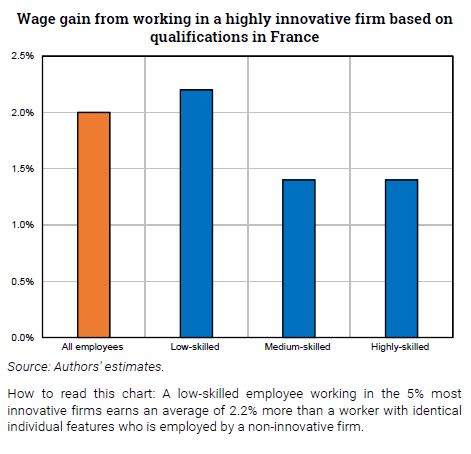Can low-skilled workers benefit from innovation in France?
Technical progress tends to destroy low-skilled jobs that can be easily automated and to increase the average wage gap between low-skilled and high-skilled workers. However, both French and British data show that low-skilled workers have a higher wage gain from working in innovative firms than high-skilled workers. These results must be seen in the context of the lower demand for low-skilled labour in these firms.
Over the last two decades in France, employment of low-skilled workers has fallen sharply compared to skilled employees. Between 2003 and 2018, the number of employees with a level of education less than or equivalent to the first cycle of secondary school decreased by 42% whilst those having graduated from higher education rose by 64%. Unemployment among low-skilled workers, which was twice as high as that for graduates in 2003, is now three times higher.
Technological change puts a drag on the employment of low-skilled workers in relative terms. It very often complements abstract tasks by boosting their productivity and makes low-skilled jobs which include many routine manual tasks easy to automate. By altering labour demand according to qualification levels, technological progress widens the wage gaps between low-skilled and highly-skilled workers.
Nevertheless, a recent survey using British data conducted by the economists P. Aghion, A. Bergeaud, R. Blundell and R. Griffith has revealed that low-skilled workers are better paid when they work for innovative firms. Low-skilled workers benefit from working for a firm that invests in R&D even more than highly-skilled employees do.
Similar results are obtained when this study is reproduced with French data. In innovative firms, low-skilled workers have a wage premium that is higher than for more skilled employees. The impact is however less pronounced than in the British case.
These outcomes should be viewed in light of lower demand for low-skilled labour in innovative firms. Among the 5% most R&D intensive firms, low-skilled employees are on average 3.5 times less numerous than highly-skilled ones. Conversely, they are five times more numerous on average in non-innovative firms. This means that employees receiving these substantial wage gains only account for a small proportion of low-skilled workers in the labour market.
